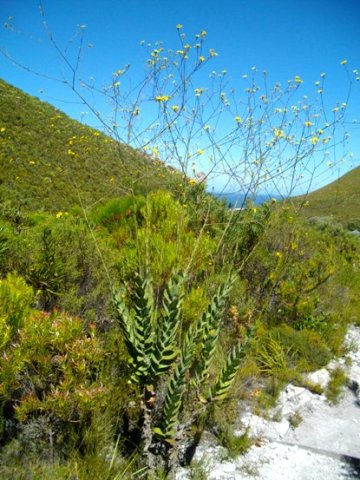Othonna quinquedentata

Author: Ivan Lätti
Photographer: Thabo Maphisa
Othonna quinquedentata, commonly known as five-toothed baboon cabbage, is a short-lived shrub that grows to heights around 2 m from a woody suffrutex that branches above-ground, producing few tall, erect and spreading stems.
Large, ascending leaves grow lower down on the branched, sturdy stem parts. The upper, tall stems are thin, leafless and wispy.
The obovate, stalkless, bluish green leaves are thinly fleshy to leathery, smooth and hairless with red spots and streaks on their surfaces. Leaves vary in length between 5 cm and 15 cm and in width between 1 cm and 5 cm. Leaf margins are usually toothed near the tips, the number of teeth may well sometimes be five as the specific name has it.
The species distribution is along the south coast of the Western Cape from the Cape Peninsula, continuing along the coastal west of the Eastern Cape.
The habitat is rocky, sandstone slopes, the plants settled in damp spots on lower fynbos slopes where large stands of the plant may grow. The species is not considered threatened in habitat early in the twenty first century (Manning, 2007; Bean and Johns, 2005; iSpot; JSTOR; http://redlist.sanbi.org).

